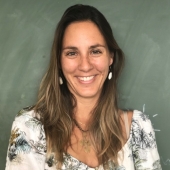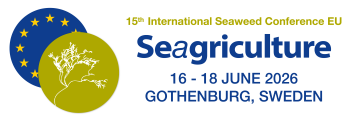About the speaker:
Dr. Mar has an MSc in Marine Microbiology and a PhD in Biological Oceanography. She has worked at the Norwegian Polar Institute and at GEOMAR Helmholtz Centre for Ocean Research Kiel, and now leads her own research group at the Alfred Wegener Institute Helmholtz Center for Polar and Marine Research on Marine Climate Change Impacts and Solutions. Her expertise covers a broad range from phytoplankton ecology and primary productivity, marine carbon dioxide removal, artificial and natural upwelling systems, climate change impacts on ecosystems, carbon and nutrient biochemistry, carbon export and microbial functional diversity. She has participated in several sea-going research expeditions from the Arctic to the Tropics, is a member of the Ocean Artificial Upwelling project and the CDRmare consortium. In 2021 she co-founded Seafields and in 2023 MacroCarbon working on the cultivation of floating seaweeds in the ocean and their valorization to sustainable hydrocarbons.
Company info:
The Alfred Wegener Institute is an internationally respected centre of expertise on polar and marine research and is a member of the Helmholtz Association, the largest scientific organization in Germany.
MacroCarbon SL is a spanish start-up based in the Canary Islands since 2023. Macrocarbon produces sustainable aviation fuel and other biofuels from floating seaweeds like pelagic Sargassum cultivated in the open ocean. At the same time store part of the carbon taken up by the seaweed in biochar and carbon black enabling long-term carbon sequestration. One of the main co-benefits of their open ocean floating seaweed aquafarms is that they act as habitats for biodiverse marine organisms.
Presentation:
Off-shore seaweed cultivation is a promising scalable option for marineCDR, especially when using fast growing floating species. However, several questions remain as to which is the most efficient pathway to store the carbon permanently, how to monitor it, and what are the co-benefits, negative impacts, and challenges of this approach. In this presentation the speaker will highlight recent results from two locations in the subtropical Atlantic: Gran Canaria and St Vincent and the Grenadines where the cultivation of floating seaweeds is planned using floating barriers. The modelling results show that the most techno-economically feasible and effective way of storing the carbon taken up by the seaweed is converting it into liquid hydrocarbons, carbon black and biochar through thermochemcial processes. A suite of novel monitoring approaches including drone images, in situ carbon uptake and biomass measurements, , enabled us to perform MRV accurately. Increased fish abundance and biodiversity and an increase in albedo revealed themselves as main co-benefits of the approach in the marine environment. The production of sustainable hydrocarbons from the process were identified as major economic co-benefit which enables economically feasible scaling while also avoiding emissions. Negative impacts include light attenuation in the water column and nutrient re-distribution. The challenges identified included permitting time-scales, off-shore operations (eg. anchoring and biofouling) and funding for the early stages of the approach. All in all, floating seaweed cultivation in the open ocean for sustainable hydrocarbons and biochar production has a huge potential for CO2 emission avoidance and permanent carbon sequestration at scale.


